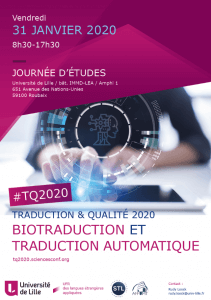On 31 January 2020, the University of Lille organised a symposium dedicated solely to machine translation (MT). It was the 7th edition in a series of one-day conferences titled “Traduction & Qualité” which have taken place every two years since 2008.
International speakers from academia as well as the professional world discussed the perception of MT, the teaching of MT and the use of MT in the professional world. Some of the speakers addressed the challenges posed by (neural) machine translation, disappearing and emerging professions in the translation sector and the quality of automatically translated texts.
Nathalie De Sutter, managing partner of Untranslate, also contributed to the programme. She started off by sharing a few interesting trends from the 2019 Language Industry Survey, like machine translation currently being the primary investment made by translation companies and Google Translate taking the first position in the list of the most widely known tools, preceding even Microsoft Office or SDL Studio. Boosted by the option of customising MT engines via user-friendly interfaces and wizards, easy integration with most CAT environments and flexible pricing models, neural machine translation has become an increasingly popular tool used by translation agencies and language professionals.

The full programme can be found here.
You can watch Nathalie’s presentation here.
